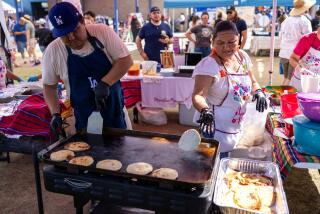Quake Relief Focuses on Cash Donations
- Share via
As the earthquake death toll in Central America neared 700 Tuesday, community leaders and worried expatriates from El Salvador scrambled to learn more about the devastation back home while calling for extra help from the United States.
This time, they said, efforts at finding quick aid should be more sophisticated than in 1998, when relief headaches made it difficult to help thousands affected by Hurricane Mitch.
“One lesson we’ve learned in seeing these disasters in Central America is that the community . . . has not been efficient” in carrying out disaster relief there, said U.S. Rep. Hilda Solis (D-El Monte) during a news conference inside the Pico-Union United Methodist Church.
She was among several calling for monetary donations, more than food and other supplies, in helping victims of Saturday’s 7.6 magnitude earthquake. Food and supplies were difficult to deliver to devastated areas after Hurricane Mitch.
Without the money to transport them, hundreds of tons of food and other supplies sat for months inside Los Angeles warehouses after the hurricane. When they made it to Nicaragua--the country most affected--the supplies piled up again in warehouses there, amid charges of government inefficiency.
With El Salvador hit hardest by Saturday’s earthquake, Solis said such problems can be avoided there by sending money directly to established rescue groups--such as the American Red Cross or the Central American Resource Center--which can then purchase the needed supplies in and around Central America.
“That way they don’t have to pay for cargo and shipping from the U.S.,” said Solis, who added that she will request that the U.S. government provide disaster relief for El Salvador.
As aftershocks continued there Tuesday, rescue workers searched through the rubble of rural towns surrounding the capital city of San Salvador. The death toll approached 700 in El Salvador and at least six more were believed dead in Guatemala. Thousands were reported injured in the entire region and the quake caused $5 billion in total damages, Solis said.
Along with other organizations scrambling to raise funds, Cardinal Roger Mahony announced that the Los Angeles Catholic Archdiocese has asked its parishes to take up a collection on behalf of quake victims.
“It’s just devastating,” Mahony said about the powerful quake. “We know in Southern California what that kind of thing means.”
Local groups said they will monitor how the relief money is spent during the coming months. They also sought to make it easier for the community of about 600,000 Salvadorans in Southern California to learn about the damage back home, or to contact family members still there.
The nonprofit Assn. of Salvadorans in Los Angeles created an Internet site (https://www.asosal.com) that lists the name of each person who has been confirmed dead. El Rescate, another nonprofit group, plans to create an Internet hookup that will allow Los Angeles families to communicate with their loved ones in El Salvador.
The U.S. Immigration and Naturalization Service agreed to help relatives of quake victims who are lawful residents to return to Central America without jeopardizing their status. They will also temporarily halt deportations to El Salvador while the country recovers from the quake, INS spokeswoman Sharon Gavin said.
*
Times staff writer Larry B. Stammer contributed to this story.
(BEGIN TEXT OF INFOBOX / INFOGRAPHIC)
How to Help
These are among the local groups aiding earthquake victims.
American Red Cross
P.O. Box 57930
Los Angeles, CA 90057
(800) HELPNOW
Pico-Union United Methodist Church
1320 S. New Hampshire Ave.
Los Angeles, CA 90006
(213) 736-1219
Central American Resource Center
2845 W. 7th St.
Los Angeles, CA 90005
(213) 385-7800
El Rescate
1340 S. Bonnie Brae St.
Los Angeles, CA 90006
(213) 387-3284
Assn. of Salvadorans of Los Angeles
660 S. Bonnie Brae St.
Los Angeles, CA 90057
(213) 483-1244
More to Read
Sign up for Essential California
The most important California stories and recommendations in your inbox every morning.
You may occasionally receive promotional content from the Los Angeles Times.













